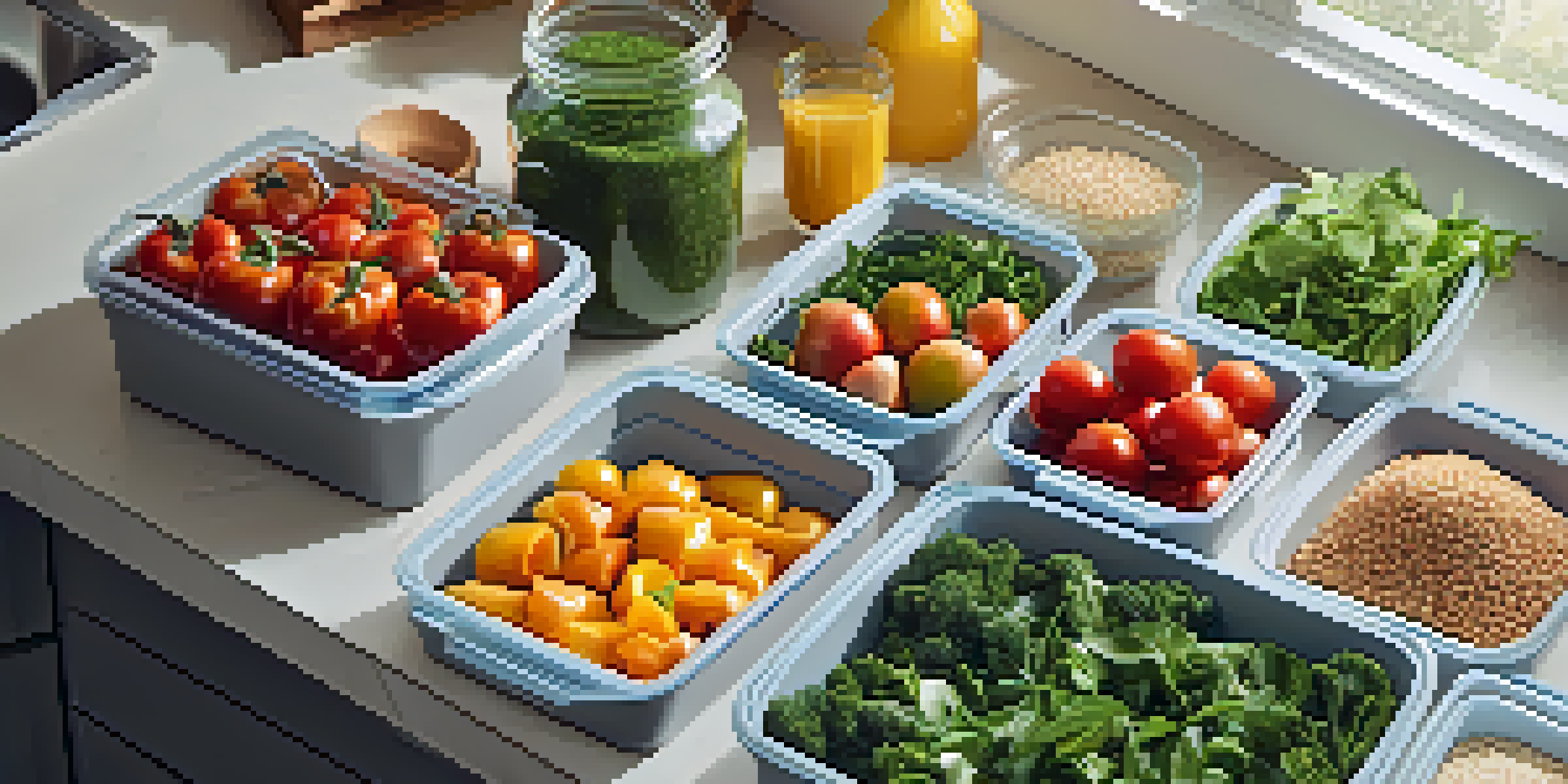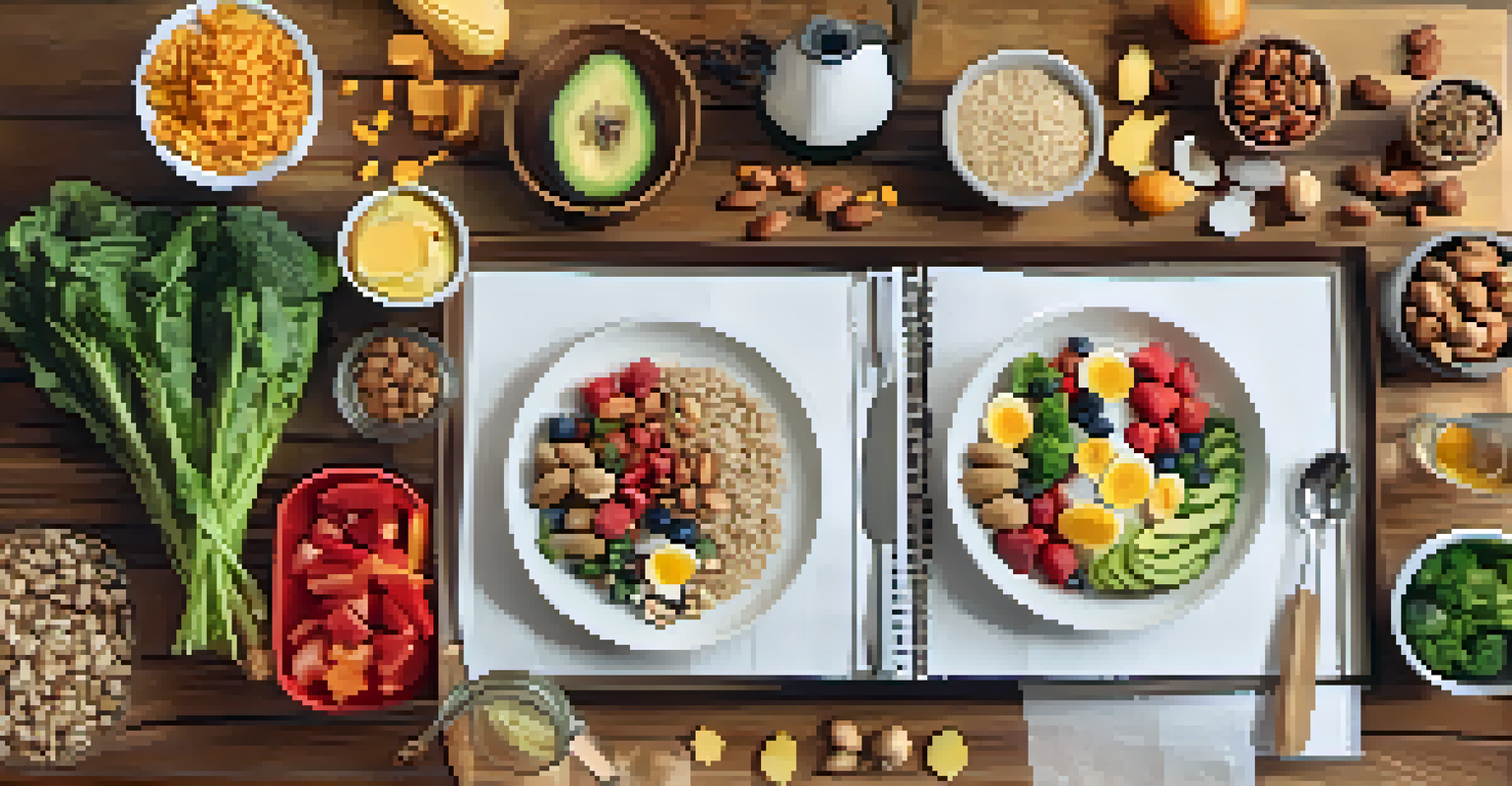How to Create a Balanced Meal Prep Plan for Bodybuilding

Understanding the Basics of Bodybuilding Nutrition
To kick things off, it's essential to grasp the fundamentals of bodybuilding nutrition. This means knowing the right balance of macronutrients: proteins, carbohydrates, and fats. Each plays a critical role in muscle growth and recovery, providing the fuel your body needs for those intense workouts.
Nutrition is not just about eating, it's about learning to live.
For instance, proteins are vital for muscle repair, while carbs provide the energy you need during exercise. Fats, although often misunderstood, are crucial for hormone production and overall health. Understanding these components will set the stage for your meal prep journey.
Ultimately, bodybuilding nutrition isn't just about eating; it's about eating the right things in the right amounts. This foundational knowledge will help you make informed choices as you develop your meal prep plan.
Calculating Your Daily Caloric Needs
Before you can start prepping meals, you need to know how many calories you should be consuming. This varies based on factors like your age, weight, activity level, and fitness goals. Online calculators can provide a good starting point, but it's also wise to consider tracking your intake for a week to see what works best for you.

For example, if your goal is to gain muscle, you'll typically want to eat more calories than you burn. Conversely, if you're looking to lose fat while maintaining muscle, a slight caloric deficit may be in order. Finding that sweet spot is key to achieving your bodybuilding goals.
Balance Macronutrients for Success
Understanding the right balance of proteins, carbohydrates, and fats is essential for effective bodybuilding nutrition.
Remember, consistency is crucial. Once you determine your daily caloric needs, stick to it as closely as possible while allowing for some flexibility. This will make meal prepping more manageable and effective.
Choosing the Right Macronutrient Ratios
With your caloric needs established, the next step is to decide on your macronutrient ratios. A common starting point for bodybuilding is a distribution of 40% protein, 40% carbs, and 20% fats. However, these ratios can be adjusted based on personal preference and how your body responds to different foods.
Success is the sum of small efforts, repeated day in and day out.
For instance, some bodybuilders may thrive on higher carbohydrates to fuel their workouts, while others may prefer increased protein for muscle recovery. It's a matter of trial and error to see what feels best for your body and supports your fitness objectives.
Incorporating a variety of sources for each macronutrient is also essential. Think lean meats for protein, whole grains for carbs, and healthy fats from avocados or nuts. This not only keeps your meals interesting but also ensures you receive a wide range of nutrients.
Creating a Weekly Meal Plan Template
Now that you have a grasp of your caloric needs and macronutrient ratios, it’s time to put together a meal plan. Begin by drafting a template that outlines your meals for the week, including breakfast, lunch, dinner, and snacks. This gives you a clear roadmap to follow, making grocery shopping and cooking much more efficient.
Consider incorporating themes for each day, like Meatless Mondays or Taco Tuesdays, to make planning more enjoyable. This approach can also help you explore new recipes and keep your meals varied and exciting.
Plan and Prepare Your Meals
Creating a weekly meal plan helps streamline grocery shopping and ensures you have nutritious meals ready for the week.
Don't forget to factor in your schedule. If you have a busy week ahead, plan for quicker meals or batch-cook items that can be easily reheated. Flexibility is key to sticking to your meal prep plan.
Grocery Shopping for Your Meal Prep Plan
Once your meal plan is set, it’s time to hit the grocery store. Create a shopping list based on your weekly menu, ensuring you have all the necessary ingredients on hand. Stick to the perimeter of the store where fresh produce, meats, and dairy typically reside, and avoid processed foods in the aisles as much as possible.
Buying in bulk can also save you money and time, especially for staple items like rice, oats, and frozen vegetables. This way, you won’t run out of vital ingredients and can prepare larger batches.
Another tip is to explore local farmer's markets for fresh produce. This not only supports local farmers but often yields higher quality ingredients that can enhance your meals.
Preparing and Storing Your Meals Efficiently
With groceries in hand, the next step is meal prep. Dedicate a specific time, usually on the weekend, to cook and portion out your meals for the week. This organized approach helps you avoid the last-minute scramble and ensures you have nutritious meals ready to go.
Using clear, labeled containers makes it easy to grab meals on the run. Consider batch cooking items like quinoa, grilled chicken, or roasted vegetables that can be mixed and matched throughout the week.
Adjust as You Progress
Regularly reassessing your caloric needs and macronutrient ratios is key to adapting your meal prep for ongoing bodybuilding goals.
Don’t forget about food storage best practices! Properly cooling and sealing your meals can extend their freshness, ensuring you enjoy every bite without waste.
Adapting Your Meal Prep Plan as You Progress
As you embark on your bodybuilding journey, it's important to remember that your meal prep plan may need adjustments along the way. As your body changes or your goals evolve, so too should your nutritional approach. Regularly reassessing your caloric intake and macronutrient ratios will help you stay on track.
For example, if you find you're gaining weight too quickly, you may want to reduce your portion sizes or adjust your carbohydrate intake. Conversely, if you're not seeing the muscle gains you desire, consider increasing your protein intake or adding in more whole foods.

Listening to your body and being open to change is crucial. Flexibility in your meal prep approach will help you stay engaged and motivated throughout your bodybuilding journey.